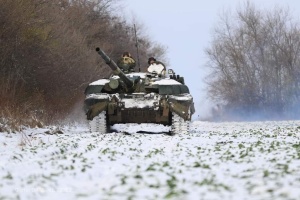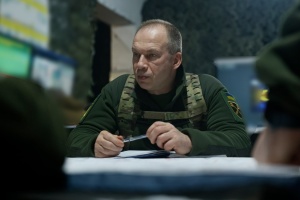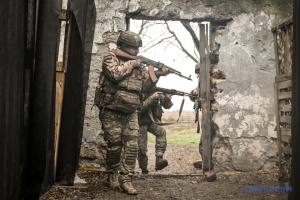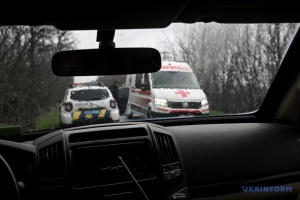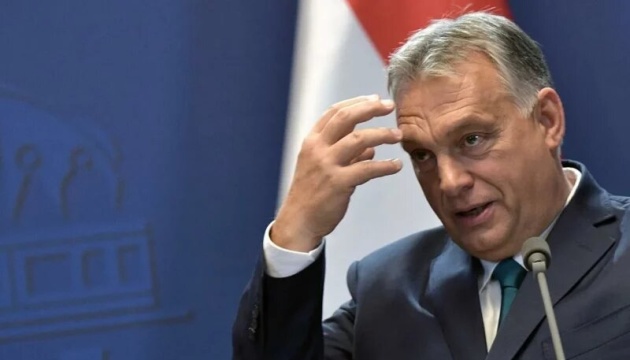
Does Orbán remember Son of Saul? A Digest of Russian Propaganda for July 22-24
The Centre for Strategic Communication and Information Security has collected the main fakes and narratives of the Russian propaganda for July 22-24.
- How Erdoğan was a “puppet of the West”
- Why Moscow needs peace talks
- What price for gas did the Hungarian PM bargain for?
- What’s wrong with Lavrov’s “regret” about Ukrainian history
How Erdoğan was a “puppet of the West”
Here is a brief timeline of Russia’s “high-precision” military and diplomatic “victory” in Odesa.
On Friday, April 22, Russian Defence Minister Shoigu personally met with his Turkish counterpart Hulusi Akar. They signed the so-called “grain deals.” UN Secretary-General António Guterres immediately called it “critical progress.”
On Saturday, April 23, Russia struck a grain warehouse in the Odesa seaport. On the same day, Akar stated that Moscow assured him that it was not the Russian military that did it.
On Sunday, July 24, Russian official MFA representative Zakharova admitted that the shooting was indeed done by the Russian military. Nobody even publicly apologized to Akar for the lie.
IN REALITY, the screenshots of these two messages with the development of the plot from “wasn’t us” to “yes, it’s us, but it was a high-precision strike” became another monument to Russian propaganda. In addition, Shoigu claimed to have destroyed Harpoon missiles, while Lavrov said they had destroyed a military boat.
After the port was struck, everyone remembered the phrase attributed to Otto von Bismarck about paper that costs more than any deals with Russians signed on it.
Many tried to play fair with the Russians, but few succeeded. Since 2014 alone, Russia has violated about 400 international agreements with Ukraine. For Ukrainians, it’s nothing new. The rest of the world is just getting used to it. The last victim was Turkish President Recep Erdoğan. Back in the day, he also went through the Kremlin propaganda purgatory.
Now. the narrative of “external management” of all “countries unfriendly to the Russian Federation” (with the Bahamas recently added to the list) is advancing mainly in the western direction. But if they act that way with Erdoğan again, who knows how things can go. About a dozen wars with Turkey show that Russia never learns anything from history.
Why Moscow needs peace talks
The Kremlin so stubbornly believes in its great diplomatic victory in Istanbul that on July 24, Foreign Minister Lavrov spoke about readiness for negotiations with Kyiv “on a wider range of issues.”
Let’s remember that four days before that, Putin claimed that “conditions for negotiations were basically there when Russian troops pulled back from the capital of Ukraine… The Kyiv authorities refused to implement the agreements, even though they were almost reached. Therefore, the final result does not depend on the mediators, but on the willingness of the parties to fulfil the agreements reached. We see today that Kyiv authorities do not really want this.”
But on his way towards “new agreements,” Lavrov expectedly shot himself in the foot, saying that “the task of denazification, demilitarization in the sense that there should be no threats to our safety from the territory of Ukraine, remains.” There goes the wide range of issues.
IN REALITY, it should be noted that Lavrov said it in Egypt, right after the strike on the Odesa seaport.
The purpose of this statement was to show, on Lavrov’s African “tour,” that a) Moscow is “peaceful,” b) Kyiv is not ready to negotiate, c) the US won’t let Ukraine finish the war, and d) who owns the situation.
Here are some more facts supporting this theory:
- Lukashenko’s recent statement that it is time for Kyiv to come to terms with the loss of territories;
- urgent preparation for September 11 — the single day of voting in Russia — when pseudo-referendums on the occupied Ukrainian territories should take place with their further inclusion into Russia’s “nuclear defence doctrine”;
- the occupiers’ lack of strength to advance further into the territory of Ukraine and efforts to somehow legally formalize the existing situation;
- extreme activity as of recent to promote the narrative in Western media that if Russia captures something, it won’t give it back, so it’s best to just agree;
- Moscow is trying to implement the Ukrainian version of the 2008 “operation to compel Georgia to make peace.” The strike on Odesa is an element of forcing Ukraine into negotiations.
In this regard, several things should be understood:
- Russia is effectively demanding that Ukraine capitulate on its terms;
- Moscow believes that now the conditions for “Istanbul-1” are more favourable than when “Minsk-2” was signed;
- Putin will not stop at any borders of the so-called “LDPR”;
- Anything can become the pretext for another attack;
- Most importantly, after the blitzkrieg failed to ensure the return of Yanukovych as Ukraine’s Gauleiter, Putin’s primary goal remains the destruction of Ukraine;
- All attempts to legitimize the occupied territories based on “peace talks” are just ways for the aggressor to win some time and regroup before another attack;
- Western society should keep in mind the phrase about the cost of paper and agreements with Russia signed on it;
- after Poland and the Baltic States, Putin’s next goal may be the “denazification of the regime of Olaf Scholz”, whose grandfather was already reported to have served in the SS, according to Russia. Nord Stream 2 remains very much on the agenda, considering its cost. And then, after Berlin, they may go for the Anglo-Saxons.
What price for gas did the Hungarian PM bargain for?
All Europeans understand perfectly these plans of Putin regarding the “new world order.” Everyone except Hungarian Prime Minister Orbán, it seems. On July 23, he said, rather provocatively, that “Ukraine will never win the war with Russia.”
Instead of Putin, Orbán is blaming Western allies for Russia’s attack on Ukraine. Let us keep in mind that before this, the Hungarian PM stubbornly demanded proof that the war crimes in Bucha were not staged by the Ukrainian authorities. In addition, Orbán expressed his disappointment with the current world politicians, noting that the war in Ukraine would not have happened if Trump were the President of the United States and Merkel were the chancellor of Germany.
At the same time, he is rather in favour of peace talks with Moscow, but not of Kyiv, but of Washington, thus repeating the Kremlin narrative that Ukraine has no agency.
In addition, Orbán returned to his rhetoric about the alleged ineffectiveness of EU sanctions against the Russian Federation. Not even any Russian allies, including Belarus, Nicaragua, Eritrea, China, North Korea and Iran, dared to make an assessment this categoric.
Interestingly, Orbán said this after the recent visit of his chief diplomat Szijjártó to Moscow, where he “fought” for “special conditions” for the supply of gas to Hungary.
Before that, as we remember, Szijjártó made a rather roundabout statement that Hungary cannot supply weapons to Ukraine because otherwise Russia would strike Zakarpattia, where Hungarians live. (At the beginning of May, that part of Ukraine was also shelled, but for some reason Orbán and Szijjártó did not rush to save its residents. Didn’t even say anything.)
This regional segregation caused indignation among Hungarians in Ukraine, particularly the head of the Hungarian community of Kyiv Tibor Tompi: “According to Szijjártó, it is acceptable to fire at me, a Ukrainian Hungarian living in Kyiv instead of Zakarpattia, and at the other 500 members of our community.”
IN REALITY, he is probably right. It’s not even about the fact that, according to some experts’ speculations, Putin promised Zakarpattia to Hungary. The problem is that the Hungarian authorities have not learned the lesson of two world wars, associating themselves with a dictator who is provoking the third world war.
Hungary did not enter the First World War of its own free will; it was part of the dual Austro-Hungarian monarchy allied to the Kaiser’s Reich. For their loyalty to the enemies of the Entente, the Hungarians paid with two-thirds of the territory of the kingdom.
But Hungary deliberately entered into an alliance with Berlin during the Second World War. And this led to participation in war crimes together with the Nazis, tragic losses on the fronts, bloody storming of Budapest by Soviet troops.
So, why do they keep wanting to make a losing bet in the looming global conflict — once again?
Is the European bureaucracy more loathsome to Hungarians than a country that is currently reviving the worst Stalinist practices? Which restored filtration and concentration camps for citizens of the occupied country in the 21st century? Which robs, deports and executes civilians? Which shells cities of a peaceful country with missiles? Which rhetorically denies a European country the right to exist? Which, in addition, also honours the organizers and participants of the suppression of the Hungarian Revolution of 1956.
It is notable that gas in Europe was free in Hitler’s gas chambers in the recent past. By the way, it was in Hungary that they filmed Son of Saul — one of the most prominent films of the modern time about Nazi crimes. Orbán must have forgotten about it. But Putin will definitely remind him. If Orbán keeps indulging him the way he is doing now.
What is wrong with Lavrov’s “regret” about Ukrainian history
On the same day, July 24, Lavrov expressed regret about what is happening with the Ukrainian history, while in Africa, and promised that the Russian and Ukrainian people would live together.
IN REALITY, there are countless examples of the occupiers destroying everything Ukrainian over the five months of the war. But if someone thinks that these are only the consequences of Putin’s intolerance, they are severely mistaken. The roots of the Russian attitude towards Ukrainians go way back in history.
1620 – the Moscow Church Council, contrary to Christian dogmas, approved the previously common practice of rechristening “Latins”, which also extended to Orthodox Ukrainians who came from the Polish-Lithuanian Commonwealth to Muscovy.
1627 – the order of Tsar Michael on the submission of the Moscow Patriarch Filaret to burn all copies of the “Teacher’s Gospel” by Kyrylo Stavrovetskyi printed in Ukraine.
1690 — Russian Orthodox Church council bans “new Kyiv books” by Petro Mohyla, Kyrylo Stavrovetskyi, Symeon Polotskyi, Lazar Baranovych, and others.
1720 – the decree of Peter I on the prohibition of printing in the Ukrainian language and the removal of Ukrainian texts from church books.
1764 – Catherine II’s instructions to Prince Alexander Vyazemsky to ensure maximum assimilation of Ukraine with Russia.
1784 – the Synod ordered Metropolitan Samuel of Kyiv and Galicia to punish the students and dismiss the teachers of the Kyiv-Mohyla Academy for abandoning the Russian language. Also, in all churches, services were ordered to be conducted “in a voice peculiar to the Russian dialect.”
1804 – school education in the Ukrainian language was prohibited by royal decree.
1863 – Valuev circular prohibited the granting of censorship permission for the printing of spiritual and popular educational literature in the Ukrainian language.
1870 – explanation of the Minister of Education of Russia, Tolstoy, that “the ultimate goal of the education of all foreigners must undoubtedly be russification.”
1876 – Emsk Decree of Alexander II on the ban on the printing and import from abroad of any Ukrainian-language literature, as well as on the ban on Ukrainian performances and the printing of sheet music of folk songs.
1881 – ban on teaching in folk schools and delivery of church sermons in the Ukrainian language.
1888 – the decree of Alexander III prohibiting the use of the Ukrainian language in official institutions and baptism with Ukrainian names.
1895 – the prohibition of the Main Department of Printing Affairs to publish Ukrainian books for children.
1914 – a ban on celebrating the 100th anniversary of Taras Shevchenko’s birth; Nikolay II’s decree banning the Ukrainian press.
1919 – repression against Ukrainian culture and language by the White Guard regime of Anton Denikin.
1926 – Stalin’s letter sanctioning the fight against “national bias”, the beginning of the persecution of “Ukrainization” activists.
1937 – execution of the Ukrainian Soviet intelligentsia in Sandarmokh forest massive, later dubbed Executed Renaissance.
1946 – the resolution of the Council of Ministers of the USSR on the approval of the Ukrainian orthography, making it closer to the Russian one.
1958 – legislative consolidation of the right of students’ parents to give up studying the Ukrainian language in schools of the Ukrainian SSR.
1972 – mass arrests of Ukrainian opposition intelligentsia. Detainees were intimidated by shooting, torture, mental hospitals and harming their relatives; many were sent to camps.
This is a far from complete chronicle of the “fraternal” attitude of Russians towards Ukrainians.
What is currently happening in the occupied territories is simply history repeating — the only difference being that now Ukrainians have their own country and an army, and can stand up for themselves. We therefore have only one choice: to fight and to liberate our land.
The Centre for Strategic Communication and Information Security

